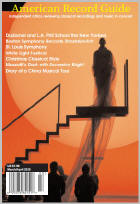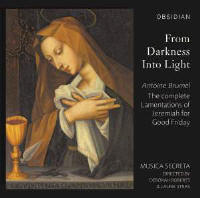Texte paru dans: / Appeared in: |
|
|
Outil de traduction ~ (Très approximatif) |
|
|
Reviewer: Charles
Brewer Titled “From Darkness into Light”, this new release contrasts music meant for Good Friday with motets that were used for other church feasts in the liturgical year. Just over 40 minutes of this recording is appropriately noted as “the complete Lamentations of Jeremiah for Good Friday” by Antoine Brumel, most likely written towards the end of his life. The earlier recordings by the Tallis Scholars (either paired with the Et Ecce Terrae Motus Mass on Gimell 454926 or on a collection of Lamentations, Sept/Oct 1998: 289) or Chanticleer (paired with the Berzerette Savoyenne Mass, May/June 1992) are of a drastically shortened version with only two verses and the traditional Lamentation refrain, “Jerusalem, convertere ad Dominum Deum tuum”. The “complete” setting was discovered by Laurie Stras, one of the directors of Musica Secreta, during her research on a manuscript with Lamentation settings copied in Florence by Antonio Moro. She offers both a short and informative booklet essay and a much longer analytical study on the Musica Secreta website.
There is every indication that Brumel’s Lamentations were not part of a traditional Tenebrae office but more likely for use in a Florentine confraternity’s own Holy-Week devotions. Compared to the flamboyance of the 12-voice Et Ecce Terrae Motus Mass, Brumel’s Lamentations are more sedate and reflective, but also filled with great artifice in combining references to the traditional Lamentation chant tone with his own set of motives, which recur through all five sections of this setting. This is a work that deserves both further study and repeated listening.
The other works included on
this release come from the “Biffoli-Sostegni” manuscript, which was copied
in 1560 for Suor Agnoleta Biffoli and Suor Clemenzia Sostegni, nuns at a
Clarissan convent in Florence. Included are motets by Josquin des Prez (‘Recordare
Virgo Mater’), Loyset Compère (‘Paranymphus Salutat Virginem’), and one by
the copyist of the both this manuscript and that with the complete
Lamentions, Antonio Moro (‘Sancta Maria Succurre Miseris’). The remaining
five works remain anonymous, including settings of the Christmas “carol”
‘Verbum Caro Factum est’ and an alternatim setting of the ‘Salve Regina’. A
number of the compositions, including the Lamentations, were transposed to
fit the voices of the women of Musica Secreta, a practice that was
apparently common in convents. In other selections the lower parts, which
lay outside the range of the singers, were supplied by a viola da gamba and
organ. Both of these adaptation techniques were also used on another recent
recording by this same ensemble (J/A 2017: 210). The interpretation is very
engaging, and each polyphonic voice is well balanced in the total texture.
| |
|
|
|
|
Cliquez l'un ou l'autre
bouton pour découvrir bien d'autres critiques de CD |
|




